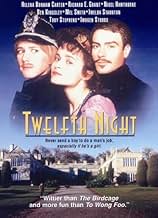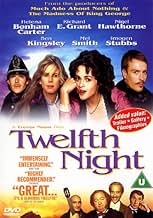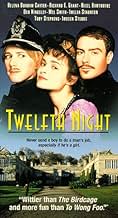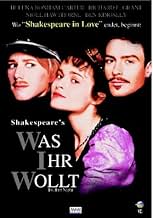Shakespeare's comedy of gender confusion, in which a girl disguises herself as a man to be near the count she adores, only to be pursued by the woman he loves.Shakespeare's comedy of gender confusion, in which a girl disguises herself as a man to be near the count she adores, only to be pursued by the woman he loves.Shakespeare's comedy of gender confusion, in which a girl disguises herself as a man to be near the count she adores, only to be pursued by the woman he loves.
- Director
- Writers
- Stars
- Awards
- 1 win & 2 nominations total
Sidney Livingstone
- Captain
- (as Sid Livingstone)
David Burke
- Party Guest
- (uncredited)
- …
- Director
- Writers
- All cast & crew
- Production, box office & more at IMDbPro
Featured reviews
As with most Shakespearian comedies, the plot is deeply implausible. However, the excellent Cornish locations at St Michael's Mount & Lanhyrock give a good sense of place and the winter setting (apart from the scene of apple picking!) comes across well - it really does look like an English winter, rather than a picture postcard snow-scene.
The play is cut down to a manageable length without losing the sense of it, The broad comedy aspects (Toby Belch et al) are thankfully limited.
The acting is well done by a cast of British stalwarts. Amazingly, Viola and Sebastian actually do look broadly alike.
This film is best viewed as an amusing light romantic comedy rather than a side-splitter.
The play is cut down to a manageable length without losing the sense of it, The broad comedy aspects (Toby Belch et al) are thankfully limited.
The acting is well done by a cast of British stalwarts. Amazingly, Viola and Sebastian actually do look broadly alike.
This film is best viewed as an amusing light romantic comedy rather than a side-splitter.
Trevor Nunn's beautifully photographed and acted, deftly written film is one of the most enjoyable adaptations of a Shakespeare play ever made. Helena Bonham Carter is pitch perfect as the beautiful Olivia, who in "deep mourning" for her dead brother, falls in love with Cesario (who happens to be a woman named Viola dressed up as a man, wonderfully played by Imogen Stubbs, the only actress I've ever seen able to create both a charming Viola and a totally believable Cesario), meanwhile Viola falls for the Duke of fictional Illyria (the exquisite Toby Stephens) who is desperately in love with the Lady Olivia. Meanwhile, Viola's lost twin brother (Steven Mackintosh of "Gentlemen Don't Eat Poets", excellent again here) winds up in Illyria and adds to the confusion. Wonderful, layered support comes from Ben Kingsley playing Feste, Olivia's fool. The only flaw, perhaps, is the few minutes before the conclusion when everything seems to be coated with a thick gloss of sugar; the film comes through this unscathed. Trevor Nunn comes through with an exquisite Shakespeare film adaptation (which is a do or die task). A great showcase for the heavenly cast featuring some of the best performances ever by Bonham Carter (save "Wings of the Dove"), Kingsley (in his best supporting turn ever), novice Stubbs, and Stephens. A very worthwhile effort. Rent it, you won't be let down.
A lively, bubbly production of one of Shakespeare's more difficult plays. It's hard to know just what Shakespeare was getting at with this story. The text doesn't always seem to make sense. That's reflected in this, as well as any other, production. At times, one wonders what the expressions on characters' faces are meant to indicate. Just after Feste has fooled Malvolio with his imitation of the curate, for instance, Maria has a perturbed look on her face. As if the joke that she herself so elaborately designed now troubles her. There's nothing in the text to indicate that her expression should show remorse; and yet Sir Toby soon after says that he's sick of the whole thing. Why? That's one example of the difficulty of the text (which may have been corrupted over the centuries), and how it is manifested in this particular production's choices. I don't know why Sir Toby remarks at this point that he's sick of the joke, nor do I know whether Maria should share his feelings.
Another difficulty is the role of Feste. Ben Kingsley fills this role, and because Ben Kingsley is a major star, he magnifies this character (in my opinion) out of all proportion. He becomes a sort of Zen master, pompous and oppressive. His jokes aren't funny (maybe we can't find Shakespeare's jokes funny today, but Kingsley's heavy delivery precludes humor), and his last confrontation with Malvolio comes off as a sort of thundering divine retribution. The entire play, the entire cast, stops dead and Feste takes over as if the whole point of the play has been his apotheosis at the expense of the degraded Malvolio. This surely cannot be what Shakespeare had in mind. Throughout the play he has a disconcerting habit of staring at other characters or the camera with what almost be described as a leer.
Maybe Shakespeare would have sighed and commiserated with the producer of this film, because the clowns in his day were also big stars who demanded a lot of meat in their roles. The trouble is that there just isn't much meat in Feste's role according to the text, so we're stuck with leers and thundering retribution and other inventions. Shakespeare had to accommodate his clowns with ever-more important roles, climaxing with characters like Touchstone and Lear's fool. Kingsley is just inventing his own character. At times his work is interesting, but his weight in the production is, as I said, oppressive.
Still, his screen time is relatively small, and much of the rest of the play is a joy, even if the point of the story isn't always clear. Bonham-Carter was never more alluring, Hawthorne is priceless as Malvolio (he was born for the role), and Smith and Grant are the perfect combination of Belch and Aguecheek. I suppose you might object that all four of them put their eyebrows to such prodigious use that their acting might be characterized as hamming. But I don't see how any of these characters can be played straight if the play is to work.
One thing is for sure, no one would ever accuse this production of bogging down. The pace is lively, the sets and the cinematography are always striking, the score is invigorating, and I suspect that I could watch this film dubbed in Swahili and it would still be a lot of fun. Visually arresting is perhaps the best description.
Another difficulty is the role of Feste. Ben Kingsley fills this role, and because Ben Kingsley is a major star, he magnifies this character (in my opinion) out of all proportion. He becomes a sort of Zen master, pompous and oppressive. His jokes aren't funny (maybe we can't find Shakespeare's jokes funny today, but Kingsley's heavy delivery precludes humor), and his last confrontation with Malvolio comes off as a sort of thundering divine retribution. The entire play, the entire cast, stops dead and Feste takes over as if the whole point of the play has been his apotheosis at the expense of the degraded Malvolio. This surely cannot be what Shakespeare had in mind. Throughout the play he has a disconcerting habit of staring at other characters or the camera with what almost be described as a leer.
Maybe Shakespeare would have sighed and commiserated with the producer of this film, because the clowns in his day were also big stars who demanded a lot of meat in their roles. The trouble is that there just isn't much meat in Feste's role according to the text, so we're stuck with leers and thundering retribution and other inventions. Shakespeare had to accommodate his clowns with ever-more important roles, climaxing with characters like Touchstone and Lear's fool. Kingsley is just inventing his own character. At times his work is interesting, but his weight in the production is, as I said, oppressive.
Still, his screen time is relatively small, and much of the rest of the play is a joy, even if the point of the story isn't always clear. Bonham-Carter was never more alluring, Hawthorne is priceless as Malvolio (he was born for the role), and Smith and Grant are the perfect combination of Belch and Aguecheek. I suppose you might object that all four of them put their eyebrows to such prodigious use that their acting might be characterized as hamming. But I don't see how any of these characters can be played straight if the play is to work.
One thing is for sure, no one would ever accuse this production of bogging down. The pace is lively, the sets and the cinematography are always striking, the score is invigorating, and I suspect that I could watch this film dubbed in Swahili and it would still be a lot of fun. Visually arresting is perhaps the best description.
Reading other reviews of 'Twelfth Night' it is interesting to see that some people think it is a slow film and others quite fast. It gripped me from the opening gust of rain on a dark night to Feste dancing off into the sunset. Grappling with Shakespeare is a perilous activity but I thought Trevor Nunn brought out the comedy and the emotions of the story well. It is a film to make you smile at the follies of mankind but also their charm.
Ben Kingsley is amazing. I've never seen Feste played that way but it seemed perfect. Imogen Stubbs does the comedy and the drama equally well. The scene with Orsino in the bathtub is a stock one but she does it beautifully, balancing the humour of the situation with the tenderness and the longing. Imelda Staunton brings unusual depth to the character of Maria. The rest of the cast are great too.
The text of the play is changed around but not unnaturally so. The scene that cuts between Feste's song and Viola/Cesario and Orsino playing cards is wonderful, taking in eight of the characters and telling you more about them. The last act of the play is difficult to stage well but Nunn gives it a good shot.
The Cornwall setting is lovely, the radiant sunshine, the green leaves and fine buildings are captured gorgeously by the cameras. I also liked the music very much and find some of the tunes quite hummable.
Very enjoyable and worth seeing again and again.
Ben Kingsley is amazing. I've never seen Feste played that way but it seemed perfect. Imogen Stubbs does the comedy and the drama equally well. The scene with Orsino in the bathtub is a stock one but she does it beautifully, balancing the humour of the situation with the tenderness and the longing. Imelda Staunton brings unusual depth to the character of Maria. The rest of the cast are great too.
The text of the play is changed around but not unnaturally so. The scene that cuts between Feste's song and Viola/Cesario and Orsino playing cards is wonderful, taking in eight of the characters and telling you more about them. The last act of the play is difficult to stage well but Nunn gives it a good shot.
The Cornwall setting is lovely, the radiant sunshine, the green leaves and fine buildings are captured gorgeously by the cameras. I also liked the music very much and find some of the tunes quite hummable.
Very enjoyable and worth seeing again and again.
Did you know
- TriviaIn the mid 1950s, director Joseph L. Mankiewicz tried to set up a version with Audrey Hepburn and Danny Kaye, but it failed to materialize.
- GoofsDuring one of the final scenes, when Malvolio reenters, it can be seen that his left shoe is missing. However, as he is walking up the stairs, you can clearly hear both heels clicking on the steps.
- How long is Twelfth Night?Powered by Alexa
Details
- Release date
- Countries of origin
- Official site
- Language
- Also known as
- Twelfth Night
- Filming locations
- Lanhydrock House, Bodmin, Cornwall, England, UK(Olivia's house and garden)
- Production companies
- See more company credits at IMDbPro
Box office
- Budget
- $5,000,000 (estimated)
- Gross US & Canada
- $588,621
- Opening weekend US & Canada
- $33,451
- Oct 27, 1996
- Gross worldwide
- $588,621
Contribute to this page
Suggest an edit or add missing content



























